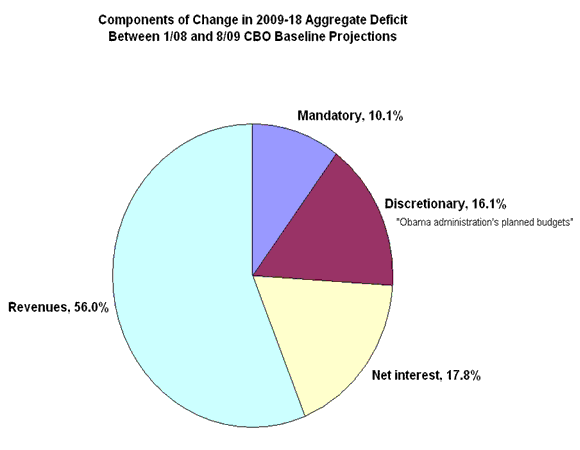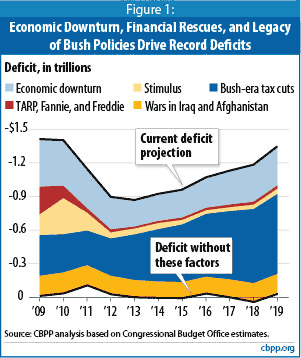A couple of weeks ago I did a a basic calculation to see why the medium-term national debt picture has gotten so much worse in the last two years. There’s no new data I created; it’s just the difference between the January 2008 and August 2009 Congressional Budget Office projections. Here’s the chart, once again:

The Center on Budget and Policy Priorities (hat tip Ezra Klein) has done a similar exercise using CBO data, except they are looking at the annual deficit, not the aggregate deficit over a decade. Here is their chart:

The Technical Note to the CBPP’s report shows how they came up with the numbers. For the most part they are using CBO estimates. They allocate debt servicing costs to the programs that led to increases in debt servicing, which seems reasonable to me. (The CBO usually leaves debt servicing as its own line, which is why I left it as its own category above.) The only questionable bit of methodology I can see is that they count AMT fixes (during the Bush years and going forward) as part of “Bush-era tax cuts”; arguably those should be part of the baseline (“Deficit without these factors”). On the other hand, the CBPP left out the Medicare prescription drug benefit (the major domestic program of the Bush era) because of uncertainty over how big a hole it will create.
When told that the recent change in our overall debt position is primarily due to lower tax revenues, not higher spending, even some people who really should know better are surprised. Similarly, many will be surprised to learn that our trillion-dollar deficits are not due to increased spending under the Obama administration, and that the stimulus spending dwindles away quickly. And where’s health care? It’s not there because it isn’t in the CBO’s baseline projections yet, but in any case the CBO projects it as net deficit-reducing over ten years (and beyond, for the Senate bill).
Klein reports that the Republicans are not going to provide a single vote to raise the debt ceiling this week, forcing a 60-40 party-line vote in the Senate, so they can use the deficit as a campaign issue next year.
- Bulenox: Get 45% to 91% OFF ... Use Discount Code: UNO
- Risk Our Money Not Yours | Get 50% to 90% OFF ... Use Discount Code: MMBVBKSM
Disclaimer: This page contains affiliate links. If you choose to make a purchase after clicking a link, we may receive a commission at no additional cost to you. Thank you for your support!


Like the initial projections for Medicare and Medicaid these projections are a bunch of non sense.